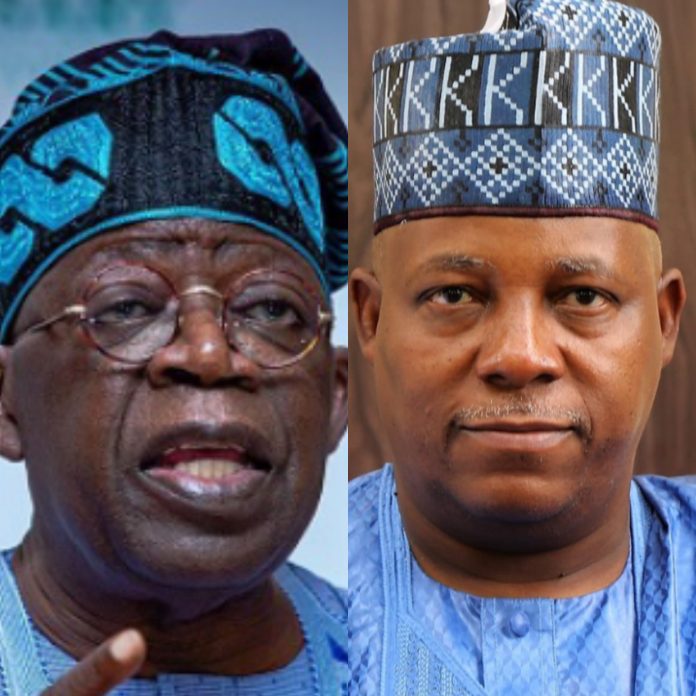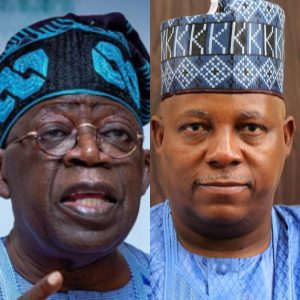Tinubu, Shettima
By Our Reporter
The Presidential Election Petitions Tribunal (PEPT) has struck out the petition filed by the Allied Peoples Movement (APM).
Justice Haruna Tsammani, Chairman of the panel struck out the petition while reading the judgement in the petition filed by APM.
The case of the APM was solely on the non-qualification of Bola Tinubu and Kashim Shettima to contest the election.
The tribunal ruled that the double nomination issue was a pre-election matter and the PEPC had no jurisdiction over it.
According to Haruna Tsammani, the APM lacked the locus standi to challenge the nomination of the candidates of another political party.
Tsammani stressed the issue of qualification or non-qualification was a pre-election matter that ought to have been ventilated at the Federal High Court 14 days after the conduct of a primary election.
“Disqualification of a candidate on the basis of double nomination is a pre-election matter.
“Allied Peoples Movement’s (APM) petition is an abuse of the court process, having ventilated the same issues before a Federal High Court.
“Their action is mala fide,” the PEPT ruled.
It also held that the issue of double nomination had been decided upon by the Supreme Court and that the matter had become res judicata.
The petition of APM was subsequently struck out.
●The meat of the matter
The APM in a petition marked CA/PEPC/04/ challenging the outcome of the Feb 25 presidential election was also heard.
The respondents are Independent National Electoral Commission(INEC), Action Progressives Congress (APC),Sen. Bola Tinubu, Sen.Kashim Shettima and Kabir Madari.
According to the APM, Tinubu and Shettima were not qualified to contest the election on the grounds of the alleged double nomination of the vice president-elect.
The judgment was delivered by Justice Haruna Tsammani the chairman of the 5 member panel.
The court held that the issues of qualification or disqualification were issues that should go to the federal high court and not at the election court.
The court held that these issues ought to have been taken at the pre hearing session .
” The petitioners have no locus standi to challenge the nomination of a candidate by his party.
The court held that if a party chose to nominate a candidate after meeting with the party’s constitution it was not the problem of another party.
” In as much as it follows the stipulations of sections 131 and 137 of the 1999 constitution of the Federal republic of Nigeria as amended ”
The court said the issue of the double nomination had not been proved by the petitioners.
It held further that the 3rd respondent, Shettima earlier withdrew his nomination as the Senator representing Borno central senatorial district.
The courtt therefore dismissed the petition for lacking in merit.
The panel stressed that though all the three cases challenging President Tinubu’s election were consolidated, the petitions will however maintain their separate identities.
During the hearing, the petitioner, through its counsel, Mr Andrew Malgwi, SAN, urged the court to sack Tinubu and withdraw the Certificate of Return that was issued to him by INEC.
The defendants, however, prayed the court to dismiss the petition for lacking in merit.
President Tinubu, through his team of lawyers led by Mr Wole Olanipekun, SAN, maintained that the petition the APM lodged against him, lacked merit.
He argued that the sole issue the party relied on to seek his removal from office, which bordered on allegation that his Vice President was nominated twice by the APC for different positions, had already been decided by the supreme Court.
President Tinubu argued that APM’s petition failed to disclose a reasonable cause of action against him just as it lacked substance.
Counsel for the APC, Mr Lateef Fagbemi, SAN, and that of INEC, Mr Steven Adehi, SAN, separately urged the court to dismiss the petition.
APC told the court that Tinubu’s nomination and eligibility to contest the presidential election that held on Feb. 25, was without fault.
For its part, INEC insisted that the election was credible.
Following submissions from all parties involved, the Justice Tsammani-led panel said it would communicate the judgement date to parties.
The News Agency of Nigeria, (NAN) reports that the APM closed its case on June 21, after calling one witness.
Specifically, APM, in its petition, contended that the withdrawal of Masari, who was initially nominated as the Vice-Presidential candidate of the APC, invalidated Tinubu’s candidacy in view of Section 131(c) and 142 of the 1999 Constitution, as amended.
The party argued that there was a gap of about three weeks between the period that Masari, who was listed as the 5th Respondent in the petition, expressed intention to withdraw, the actual withdrawal of his purported nomination, and the time Tinubu purportedly replaced him with Shettima.
It further argued that Tinubu’s candidature had elapsed as at the time he nominated Shettima as Masari’s replacement.
According to the petitioner, as at the time Tinubu announced Shettima as the Vice- Presidential candidate, he was no longer in a position, constitutionally, to nominate a running mate.
This they said was because he had ceased to be a presidential candidate of the 2nd Respondent having regards to the provisions of section 142 of the 1999 Constitution”.
More so, APM, contended that Masari’s initial nomination activated the joint ticket principle enshrined in the constitution, stressing that his subsequent withdrawal invalidated the said joint ticket.
It, therefore, prayed the court to declare that Shettima was not qualified to contest as the Vice-Presidential candidate of the APC as at Feb. 25 when the election was conducted.
“An order nullifying and voiding all the votes scored by Tinubu in the presidential election in view of his non-qualification as a candidate of the APC”.
As well as an order to set aside the Certificate of Return that was issued to the President by INEC.
The court had on May 30, suspended further proceedings in the matter after counsel to President Tinubu, Olanipekun, SAN, drew its attention to a judgement of the Supreme Court which he said settled the issue the APM raised in its petition.
Chief Olanipekun, SAN, maintained that an appeal the Peoples Democratic Party, PDP, filed against President Tinubu, which was dismissed by the Supreme Court, bordered on the legality or otherwise of his client’s nomination to contest the election by the APC.
He argued that the said judgment of the apex court touched on the substance of APM’s petition.
Tinubu’s lawyer stressed that the only ground the APM canvassed in its petition, was the fact that the Vice President, Shettima, had double nominations, prior to the presidential election that held on February 25.
Insisting that the issue had since been settled by the Supreme Court, Tinubu’s lead counsel, said: “As officers of this court, it behoves us to assist the court in all circumstances and also bring to the attention of yours lordships, decisions of courts, even from other jurisdictions, which relate to any matter pending before yours lordships.
“Even if those decisions do not necessarily align with the interest of our clients. If becomes more imperative if we are aware or abreast of any decision of the Supreme Court which touches on matters within the proceedings before your lordships.
“In this wise my lords, this particular petition which has just been called in respect of which the sole issue that is being ventilated is the nomination of the 1st Respondent who we represent.
“We are aware that the Supreme Court gave a judgement on the issue on Friday, May 23, in respect of appeal No: SC/CV/501/2023, and the parties involved were PDP Vs INEC& 3 Ors, where the apex court considered all the issues and resolved them.
“We will confirm from the petitioners, whether in the light of the Supreme Court decision, there will still be the need to continue with this petition,” he added.
Following its decision not to withdraw the petition, the APM tendered in evidence before the court, exhibits it said would establish its case that Tinubu was ineligible to contest the presidential election.
Part of exhibits the petitioner tendered in evidence through the witness, Aisha Abubakar, who identified herself as the Assistant Welfare Director of the party, included documents on Masari’s withdrawal as Tinubu’s running mate for the election.
However, before the witness could exit the box, APC’s lead counsel, Prince Fagbemi, SAN, tendered through her, a copy of the Supreme Court judgement which the Respondents said had earlier settled the issue the APM raised in the petition.
On his part, INEC’s lawyer, Mr. Kemi Pinhero, tendered before the court, a letter dated July 6, which the APC wrote to Chairman of the Commission, Prof. Mahmoud Yakubu, notifying him of the withdrawal of Shettima’s nomination as its senatorial candidate in Borno state.
Equally admitted in evidence by the court was a letter that indicated that one Mr. Lawal Kaka Shehu, was subsequently nominated to replace Shettima as APC’s flag-bearer for senatorial poll.
After the witness was discharged from the box, a Deputy Director at the INEC, Mr. John Arabs, who was summoned through a subpoena, produced and tendered documents in evidence, among which included the “original online form” which Shettima submitted to indicate his withdrawal from the senatorial race.
Meanwhile, Vice President Kashim Shettima, Femi Gbajabimila, were all present in the Court of Appeal complex, venue of the presidential election petition court (PEPC) for the judgment in the petitions challenging the election of. President Bola Tinubu.
Also present in court are Dr Abdullahi Ganduje, APC National chairman, governors of Bauchi, Yobe, Kogi, Ekiti, Imo, Nassarawa, Festus Keyamo and Nuhu Ribadu, National security adviser to the president.
The presidential election petition court had on Monday fixed today for the judgments in petitions filed by Peoples Democratic Party (PDP) it’s candidate and Labour Party and it’s presidential candidate.
The third petition was filed by the Allied Peoples Movement (APM).
NAN reports that there is heavy security presence at the appellate court.


